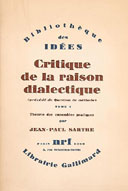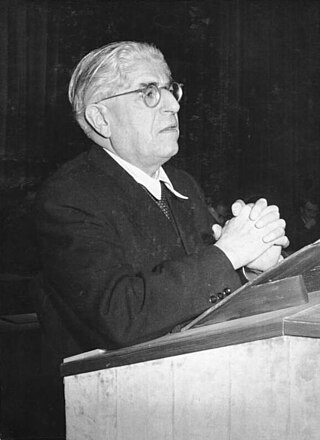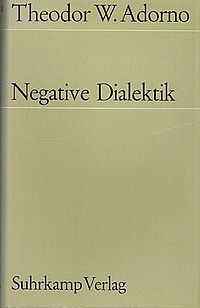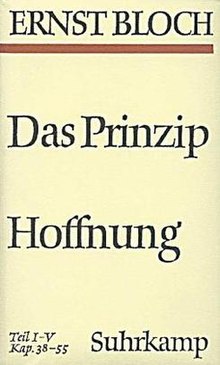
Critique of Dialectical Reason is a 1960 book by the philosopher Jean-Paul Sartre, in which the author further develops the existentialist Marxism he first expounded in his essay Search for a Method (1957). Critique of Dialectical Reason and Search for a Method were written as a common manuscript, with Sartre intending the former to logically precede the latter. Critique of Dialectical Reason was Sartre's second large-scale philosophical treatise, Being and Nothingness (1943) having been the first. The book has been seen by some as an abandonment of Sartre's original existentialism, while others have seen it as a continuation and elaboration of his earlier work. It was translated into English by Alan Sheridan-Smith.

Ernst Simon Bloch was a German Marxist philosopher. Bloch was influenced by Georg Wilhelm Friedrich Hegel and Karl Marx, as well as by apocalyptic and religious thinkers such as Thomas Müntzer, Paracelsus, and Jacob Böhme. He established friendships with György Lukács, Bertolt Brecht, Kurt Weill, Walter Benjamin, and Theodor W. Adorno. Bloch's work focuses on an optimistic teleology of the history of mankind.

Feng Youlan was a Chinese philosopher, historian, and writer who was instrumental for reintroducing the study of Chinese philosophy in the modern era. The name he published under in English was 'Fung Yu-lan,' as used in the Bodde translation of A History of Chinese Philosophy. This earlier spelling also occurs in philosophical discussions, see for example the work of Wing-tsit Chan.

Henri Lefebvre was a French Marxist philosopher and sociologist, best known for furthering the critique of everyday life, for introducing the concepts of the right to the city and the production of social space, and for his work on dialectical materialism, alienation, and criticism of Stalinism, existentialism, and structuralism. In his prolific career, Lefebvre wrote more than sixty books and three hundred articles. He founded or took part in the founding of several intellectual and academic journals such as Philosophies, La Revue Marxiste, Arguments, Socialisme ou Barbarie, and Espaces et Sociétés.

Leszek Kołakowski was a Polish philosopher and historian of ideas. He is best known for his critical analyses of Marxist thought, such as in his three-volume history of Marxist philosophy Main Currents of Marxism (1976). In his later work, Kołakowski increasingly focused on religious questions. In his 1986 Jefferson Lecture, he asserted that "we learn history not in order to know how to behave or how to succeed, but to know who we are".

Michael Löwy is a French-Brazilian Marxist sociologist and philosopher. He is emeritus research director in social sciences at the CNRS and lectures at the École des hautes études en sciences sociales. Author of books on Karl Marx, Che Guevara, Liberation Theology, György Lukács, Walter Benjamin, José Carlos Mariátegui, Lucien Goldmann and Franz Kafka, he received the CNRS Silver Medal in 1994.

Eros and Civilization: A Philosophical Inquiry into Freud is a book by the German philosopher and social critic Herbert Marcuse, in which the author proposes a non-repressive society, attempts a synthesis of the theories of Karl Marx and Sigmund Freud, and explores the potential of collective memory to be a source of disobedience and revolt and point the way to an alternative future. Its title alludes to Freud's Civilization and Its Discontents (1930). The 1966 edition has an added "political preface".

Negative Dialectics is a 1966 book by the philosopher Theodor W. Adorno, in which he presents a critique of traditional Western philosophy and dialectical thinking. Adorno argues that the Enlightenment's emphasis on reason and progress has led to the domination of nature and the suppression of human individuality, and he develops the notion of negative dialectics as a critique of the positive, idealistic dialectics of Hegel and the Marxist dialectical materialism that grew out of it.
Thrownness is a concept introduced by German philosopher Martin Heidegger (1889–1976) to describe humans' individual existences as being 'thrown' (geworfen) into the world.

Robert S. Corrington is an American philosopher and author of many books exploring human interpretation of the universe as well as biographies on C.S. Peirce and Wilhelm Reich. He is currently the Henry Anson Buttz Professor of Philosophical Theology at Drew University in Madison, New Jersey. Before that he was a professor at Pennsylvania State University. He is a Senior Fellow of the American Institute for Philosophical and Cultural Thought.
Institute of Philosophy of the University of Warsaw is a research institution located in Warsaw, part of the Faculty of Philosophy and Sociology of the University of Warsaw. It is renowned mainly for its contribution to the development of modern logic and analytic philosophy and to history of ideas. Provides master's degree studies, doctor's degree studies and postgraduate studies in philosophy both in Polish and in English.

Main Currents of Marxism: Its Origins, Growth and Dissolution is a work about Marxism by the political philosopher Leszek Kołakowski. Its three volumes in English are The Founders, The Golden Age, and The Breakdown. It was first published in Polish in Paris in 1976, with the English translation appearing in 1978. In 2005, Main Currents of Marxism was republished in a one volume edition, with a new preface and epilogue by Kołakowski. The work was intended to be a "handbook" on Marxism by Kołakowski, who was once an orthodox Marxist but ultimately rejected Marxism. Despite his critical stand toward Marxism, Kołakowski endorsed the philosopher György Lukács's interpretation of the philosopher Karl Marx.
Marxist humanism is an international body of thought and political action rooted in a humanist interpretation of the works of Karl Marx. It is an investigation into "what human nature consists of and what sort of society would be most conducive to human thriving" from a critical perspective rooted in Marxist philosophy. Marxist humanists argue that Marx himself was concerned with investigating similar questions.
This is a list of information about philosophy in 1954.

The correct place of Karl Marx's early writings within his system as a whole has been a matter of great controversy. Some believe there is a break in Marx's development that divides his thought into two periods: the "Young Marx" is said to be a thinker who deals with the problem of alienation, while the "Mature Marx" is said to aspire to a scientific socialism.

Herbert Marcuse was a German–American philosopher, social critic, and political theorist, associated with the Frankfurt School of critical theory. Born in Berlin, Marcuse studied at Berlin's Friedrich Wilhelm University and then at Freiburg, where he received his Ph.D. He was a prominent figure in the Frankfurt-based Institute for Social Research, which later became known as the Frankfurt School. In his written works, he criticized capitalism, modern technology, Soviet Communism, and popular culture, arguing that they represent new forms of social control.

George Louis Kline was a philosopher, translator, and prominent American specialist in Russian and Soviet philosophy, author of more than 300 publications, including two monographs, six edited or co-edited anthologies, more than 165 published articles, book chapters, and encyclopedia entries, over 55 translations, and 75 reviews. The majority of his works are in English, but translations of some of them have appeared in Russian, German, French, Spanish, Portuguese, Polish, Serbo-Croatian, Korean and Japanese. He is particularly noted for his authoritative studies on Spinoza, Hegel, and Whitehead. He was President of the Hegel Society of America (1984–86), and President of the Metaphysical Society of America (1985–86). He has also made notable contributions to the study of Marx and the Marxist tradition. He attended Boston University for three years (1938–41), but his education was interrupted by service in the U.S. Army Air Corps during WW II, for which he was awarded the Distinguished Flying Cross.

György Lukács was a Hungarian Marxist philosopher, literary historian, literary critic, and aesthetician. He was one of the founders of Western Marxism, an interpretive tradition that departed from the Soviet Marxist ideological orthodoxy. He developed the theory of reification, and contributed to Marxist theory with developments of Karl Marx's theory of class consciousness. He was also a philosopher of Leninism. He ideologically developed and organised Lenin's pragmatic revolutionary practices into the formal philosophy of vanguard-party revolution.
Dialectical materialism is a materialist theory based upon the writings of Karl Marx and Friedrich Engels that has found widespread applications in a variety of philosophical disciplines ranging from philosophy of history to philosophy of science. As a materialist philosophy, Marxist dialectics emphasizes the importance of real-world conditions and the presence of functional contradictions within and among social relations, which derive from, but are not limited to, the contradictions that occur in social class, labour economics, and socioeconomic interactions. Within Marxism, a contradiction is a relationship in which two forces oppose each other, leading to mutual development.
Western Marxism is a current of Marxist theory that arose from Western and Central Europe in the aftermath of the 1917 October Revolution in Russia and the ascent of Leninism. The term denotes a loose collection of theorists who advanced an interpretation of Marxism distinct from classical and Orthodox Marxism and the Marxism-Leninism of the Soviet Union.














